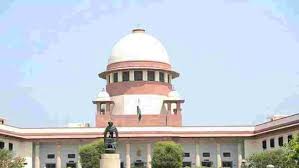CURRENT AFFAIRS
Get the most updated and recent current affair content on Padhaikaro.com
SC asks Centre to clarify on legality of cryptocurrency
- IAS NEXT, Lucknow
- 28, Feb 2022

Reference News:-
The Supreme Court has asked the Centre whether dealing with cryptocurrencies like bitcoin is legal in India.
- The Court posed the query while hearing a plea by one of the accused in the GainBitcoin scam, seeking quashing of the charges against him.
How is it regulated?
There’s no formal regulation on cryptocurrencies in India so far. The Centre has been working on crypto regulatory framework since 2019 but is yet to introduce a bill.
- The central bank has always maintained a strong stance against private digital currencies. It had banned the banking system from aiding such trades, which was struck down by the Supreme Court in 2020.
Latest developments:
- In Union Budget 2022, finance minister Nirmala Sitharaman had proposed 30 per cent tax on earnings from cryptocurrencies and non-fungible tokens (NFTs).
- She also said that losses from their sale could not be offset against other income, delivering another disincentive to trading and investment in digital assets.
- The government also introduced 1 per cent tax deducted at source (TDS) on digital assets.
- It also announced that RBI will introduce its digital currency in FY23 that will lead to more efficient and cheaper currency management system.
What are Cryptocurrencies?
Cryptocurrencies are digital currencies in which encryption techniques are used to regulate the generation of units of currency and verify the transfer of funds, operating independently of a central bank.
- They use Blockchain technology.
- Examples: Bitcoin, Ethereum etc.
Why is the RBI against the use of cryptocurrencies?
Sovereign guarantee: Cryptocurrencies pose risks to consumers. They do not have any sovereign guarantee and hence are not legal tender.
Market volatility: Their speculative nature also makes them highly volatile. For instance, the value of Bitcoin fell from USD 20,000 in December 2017 to USD 3,800 in November 2018.
Risk in security: A user loses access to their cryptocurrency if they lose their private key (unlike traditional digital banking accounts, this password cannot be reset).
Malware threats: In some cases, these private keys are stored by technical service providers (cryptocurrency exchanges or wallets), which are prone to malware or hacking.
SC Garg Committee recommendations (2019):
- Ban anybody who mines, hold, transact or deal with cryptocurrencies in any form.
- It recommend a jail term of one to 10 years for exchange or trading in digital currency.
- It proposed a monetary penalty of up to three times the loss caused to the exchequer or gains made by the cryptocurrency user whichever is higher.
- However, the panel said that the government should keep an open mind on the potential issuance of cryptocurrencies by the Reserve Bank of India.